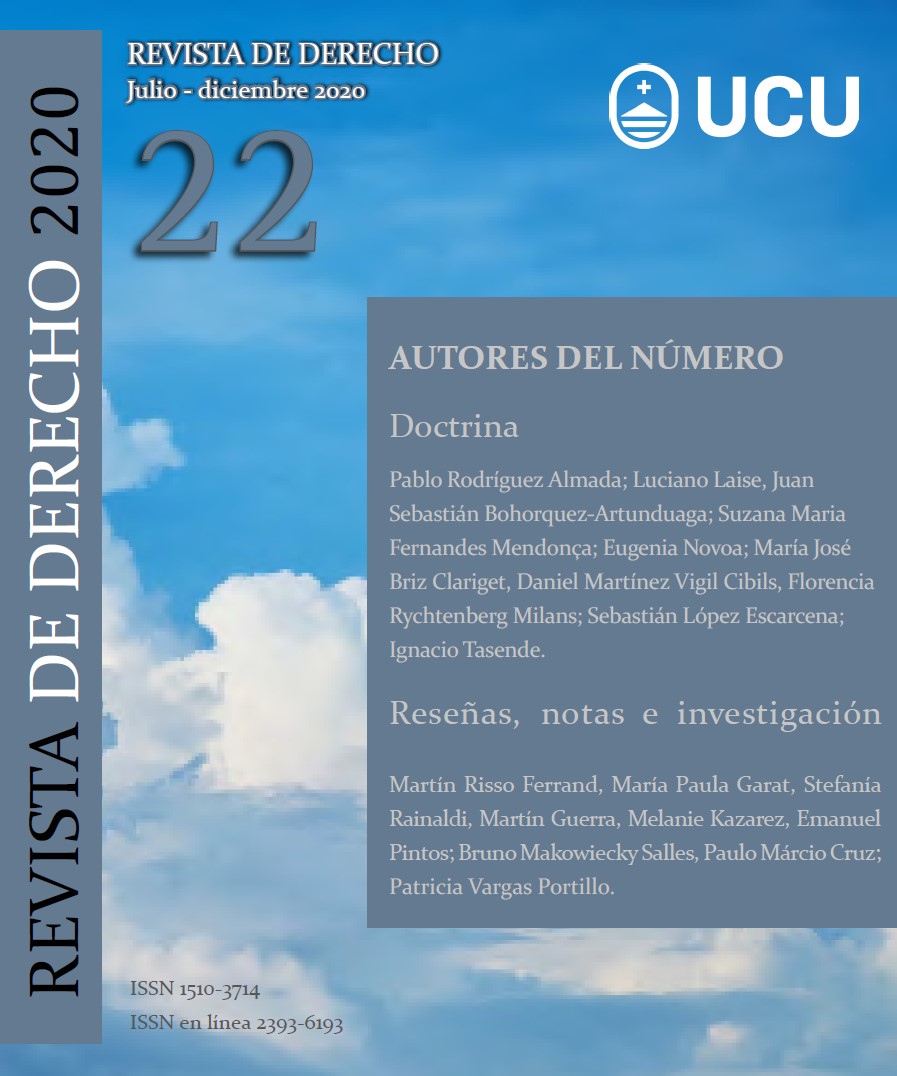The Government Co-participation Covenants Occurred in the Second Half of the XIX Century and the Beginning of the XX Century in Uruguay: Oral Constitutional Mutations and Constituent Process
DOI:
https://doi.org/10.22235/rd22.2156Keywords:
Constitution, revolutions, political parties, co-participation, constituent processAbstract
In Uruguay, during the second half of the 19th century and the beginning of the 20th century, three significant political events occurred in the history of the co-participation of political parties in the Government: the two main ones were the Pacto de Abril (April Pact) in 1872 and the Pacto de la Cruz (Pact of the Cross) in 1897, and the third one, less significant due to its duration, the Pacto de Nico Pérez (Pact of Nico Pérez) in 1903. The referred pacts, which were oral, meant the co-participation of the political parties in the departmental governments and, consequently, also in the Legislative Power. These political agreements which were preceded by revolutions promoted by the Partido Nacional (National Party), were applied, with some interruptions and modifications, for thirty-two years, even during de facto governments. This article analyses these co-participation agreements and the violation of the Constitution they represented, as they became oral constitutional mutations. It is intended to prove that while these constitutional changes had no normative force (because custom is not a formal source of law in Uruguay) and no political consensus (they were applied as a way to avoid armed conflict), they were part of a constitutional process that continued with modifications to constitutional procedures and electoral laws, and ended with the entry into force of the Constitution of 1918.
Downloads
References
Barrán, J. P. (1998). Historia Uruguaya. Tomo 4. Apogeo del Uruguay Pastoril y Caudillesco 1839-1875. Montevideo, Uruguay: Ediciones de la Banda Oriental-La República.
Cagnoni, J. A. (2006). El Derecho Constitucional Uruguayo. Montevideo, Uruguay: Edición del autor.
Cassinelli Muñoz, H. (2009). Derecho Público (3ª actualización). Montevideo, Uruguay: F.C.U.
Castellanos, A. (2011). Historia Uruguaya 5. La Cisplatina, la Independencia y la República caudillesca. 1820-1838. Montevideo, Uruguay: Ediciones de la Banda Oriental.
Cayota, M. (1998). La visión de los historiadores. En Reforma constitucional y estructura política (pp. 53-67). Montevideo, Uruguay: Centro de Estudios Estratégicos 1815-Ediciones de la Banda Oriental.
Errandonea, A. (1998). La visión de los sociólogos. En Reforma constitucional y estructura política (pp. 101-108). Montevideo, Uruguay: Centro de Estudios Estratégicos 1815-Ediciones de la Banda Oriental.
Fernández, N. y Machin, H. (2017). Una democracia única. Tomo II- Las votaciones y los liderazgos. Montevideo, Uruguay: Editorial Fin de Siglo.
Frega, A. (2007). Capítulo 1 - La formulación de un modelo. 1890-1918. En A. Frega, A. M. Rodríguez Aycaguer, E. Ruiz, R. Porrini, A. Islas, D. Bonfanti, M. Broquetas, I. Cuadro, Historia del Uruguay en el siglo XX (1890-2005) (pp. 17-50). Montevideo, Uruguay: Ediciones de la Banda Oriental.
Gamarra, D. (2014). Interpretación de enunciados constitucionales y mutaciones en sentido débil en el ordenamiento jurídico uruguayo. La Justicia Uruguaya, 149, 57-66.
Garcé, A. (2017). Hacia una teoría ideacional de la difusión institucional. La adopción y adaptación del presidencialismo en América Latina durante el siglo XIX. Revista Española de Ciencia Política, 44. 13-41. https://doi.org/10.21308/recp.44.01
Garcé, A. y García, E. (2019). Evolución cognitiva y conocimiento reflexivo. La teoría de los órdenes sociales de Emanuel Adler y la elección de la Convención Nacional Constituyente en Uruguay (1916). Revista Araucaria. Revista Iberoamericana de Filosofía, Política, Humanidades y Relaciones Internacionales, 21(42), 243-276.
Giménez Rodríguez, A. (2019). Ilustrados y Valientes. El Uruguay desde sus orígenes al Siglo XXI. Montevideo, Uruguay: Ediciones Cruz del Sur.
Gros Espiell, H. (1956). Las constituciones del Uruguay. Madrid, España: Ediciones Cultura Hispánica.
Gros Espiell, H. (2003). Regulación jurídica de los Partidos Políticos en Uruguay. En D. Zovatto (coord.), Regulación jurídica de los Partidos Políticos en América Latina (pp. 853-891). México, D. F., México: UNAM. Recuperado de: https://www.idea.int/sites/default/files/publications/chapters/regulacion-juridica-de-los-partidos-politicos-en-america-latina/regulacion-juridica-de-los-partidos-politicos-ena-america-latina-uruguay-17.pdf
Gros Espiell, H. y Arteaga, J. J. (1991). Esquema de la evolución constitucional del Uruguay (2ª ed.). Montevideo, Uruguay: F.C.U.
Gros Espiell, H. y Esteva, E. (2005). Constituciones Iberoamericanas Uruguay. Recuperado de: https://biblio.juridicas.unam.mx/bjv/detalle-libro/1739-constituciones-iberoamericanas-uruguay
Jiménez De Aréchaga, J. (2016). Teoría del Gobierno (2ª ed.). Montevideo, Uruguay: F.C.U.
Korzeniak, J. (2008). Primer Curso de Derecho Público –Derecho Constitucional (4ª ed.). Montevideo, Uruguay: F.C.U.
Loewenstein, K. (1986). Teoría de la Constitución (4ª reimp.). Barcelona, España: Editorial Ariel.
Maiztegui Casas, L. R. (2011). Caudillos. Montevideo, Uruguay: Editorial Planeta.
Méndez Vives, E. (2011). Historia Uruguaya 7. El Uruguay de la modernización. 1876-1904. Montevideo, Uruguay: Ediciones de la Banda Oriental.
Nahum, B. (2011). Historia Uruguaya 8. La época batllista. 1905-1929. Montevideo, Uruguay: Ediciones de la Banda Oriental.
Nahum, B. (2016). Breve Historia del Uruguay Independiente (9ª ed.). Montevideo, Uruguay: Ediciones de la Banda Oriental.
Nahum, B. (2017). Manual de Historia del Uruguay. Tomo I: 1830-1903 (20ª ed.). Montevideo, Uruguay: Ediciones de la Banda Oriental.
Pisarello, G. (2016). Procesos constituyentes. Caminos para la ruptura democrática. Madrid, España: Editorial Trotta.
Risso Ferrand, M. (2017). Mutación e interpretación evolutiva de la Constitución - Dos casos uruguayos. Estudios Constitucionales, 15(1), 217-254.
Rodríguez Almada, P. (2016). Proceso de elaboración de los Decretos de las Juntas Departamentales. Revista de Legislación Uruguaya, 7(7), 1561-1604.
Rollnert Liern, G. (2014). La mutación constitucional, entre la interpretación y la jurisdicción constitucional. Revista Española de Derecho Constitucional, 101, 125-155.
Sant’ana Pedra, A. (2012). La elasticidad del texto de la Constitución como límite para las mutaciones constitucionales. Estudio Avanzados, 17, 39-61. Disponible en: http://www.revistas.usach.cl/ojs/index.php/ideas/article/view/519
Uribe Arzate, E. y Correa Esquivel, G. A. (2012). Mutaciones constitucionales y la problemática de su control en el Estado constitucional. Revista de Derecho, 38, 196-224. Recuperado de http://www.redalyc.org/articulo.oa?id=85124997007
Véscovi, E. (1995). Introducción al Derecho (18ª ed.). Montevideo, Uruguay: Editorial Idea.
Downloads
Published
How to Cite
Issue
Section
License
Copyright (c) 2020 Revista de Derecho

This work is licensed under a Creative Commons Attribution 4.0 International License.













